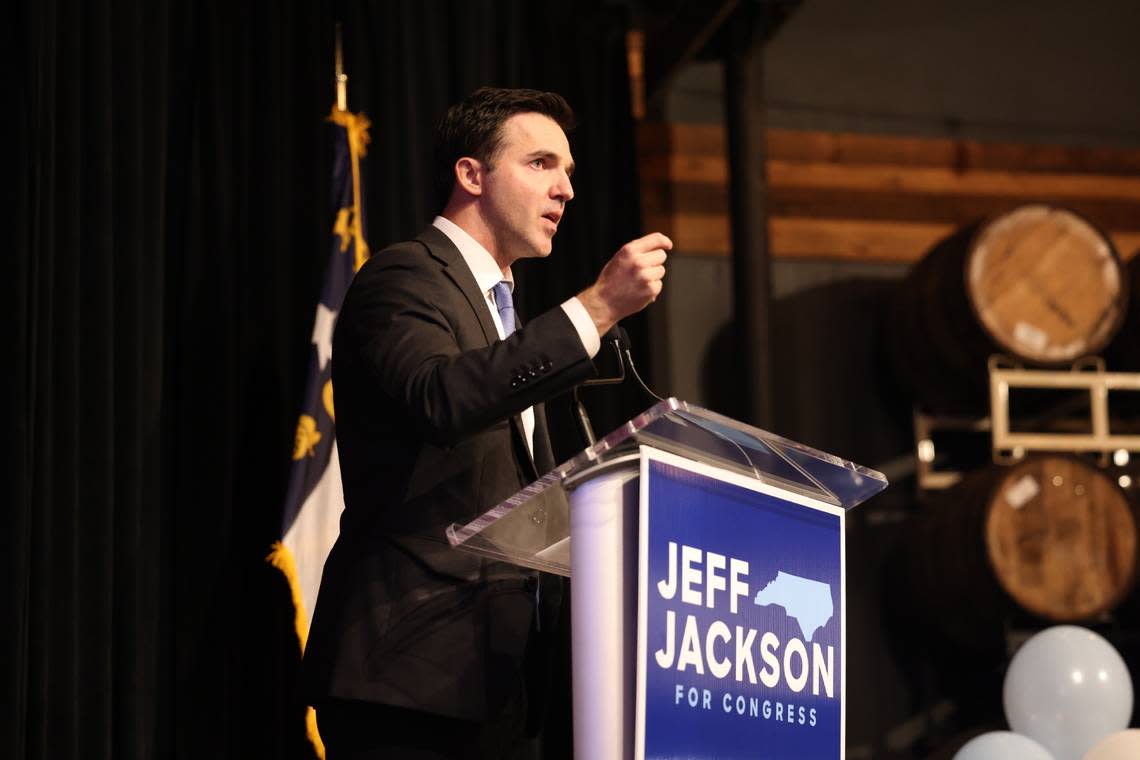US House approves extending debt ceiling. Here’s how NC representatives voted.
North Carolina Republicans battled one another until the last minute as the U.S. House voted to pass a bill to extend the country’s debt ceiling until Jan. 1, 2025.
The final vote to approve the bill was 314-117. Thirteen of 14 members of the North Carolina delegation approved the bill, though Rep. Deborah Ross was absent due to illness. Republican Rep. Dan Bishop was the only North Carolina member to oppose the bill.
Bishop, from Charlotte, has spent more than four days speaking out against the bill, House Speaker Kevin McCarthy and his negotiators, who included Rep. Patrick McHenry, a Republican from Lincoln County.
“This is what it looks like when the uniparty cartel sells out the American people. #NoDeal,” Bishop tweeted shortly after the vote.
House Republicans are calling it the biggest spending cut in United States history, and McCarthy told his caucus that they would be on the “wrong side of history” if they chose to vote against it because the bill contained some things they didn’t like.
“We are finally bending the curve on discretionary spending because of this bill,” McCarthy said on the House floor Wednesday night. “And we are doing it while, at the same time, raising our national defense and veterans fully funded and social security and Medicare fully preserved and all of this without raising a penny in new taxes. That is a major victory.”
Not only does the bill extend the debt ceiling until after the next presidential election, it also claws back unspent COVID relief funds, cuts $21.4 billion in IRS funding, increases work requirements to social safety net programs, and forces paused federal student loan repayments to begin again at the end of August.
The bill now moves to the Senate, which expects to take it up as early as Thursday.
The House Republicans caucused Saturday night immediately after President Joe Biden and McCarthy announced they reached an agreement on the debt ceiling. Members of the ultraconservative House Freedom Caucus immediately vocalized that the bill left off a long list of requests they wanted in the bill.
Bishop saw it as betrayal by McCarthy and McHenry after Republicans united behind McCarthy — after 15 votes — to vote him in as House speaker in exchange for several promises he made to the Freedom Caucus.
Bishop called on his colleagues to vote against the bill and suggested they oust McCarthy as House speaker.
“I think it’s wrongheaded,” McHenry said Wednesday. “I’m disappointed in his statements, but the fact is we have a negotiated outcome. His goals and my goals are the same.”
He added that those goals include fiscal restraint and preventing the country from going bankrupt.
Republicans signal their intentions
It became clear mid-afternoon that not all Republicans were falling in line with McCarthy and his negotiators. Around 3:30 p.m. the House met to vote on whether to move the debt ceiling bill to the House floor. If McCarthy failed to secure enough votes to move the bill forward, the bill would have died before even being debated on the floor.
McCarthy needed a simple majority of the House voting in favor of the bill, or 218 votes if every House member voted. Halfway through the vote, it became clear that Republicans didn’t have the numbers on their own.
As the initial vote went on, House Minority Leader Hakeem Jeffries held up a green card signaling he needed some of the Democrats to change their votes to “yes.”
Out of the North Carolina delegation, Reps. Don Davis of Snow Hill, Wiley Nickel of Cary and Kathy Manning of Greensboro voted “yes” to send the bill to the floor. All of North Carolina’s Republicans voted “yes,” except for Bishop.
Rep. Alma Adams said an hour before the vote that she was struggling to decide how she would vote, but leaning on offering her support. She said the bill includes some benefits, such as helping veterans and people who are homeless, but she remained concerned about the negative impact it would have on Black women.
She wanted to hear the full debate before making a decision.
Rep. Greg Murphy, a Republican from Greenville, spoke during an hour-long debate on the bill and asked his fellow Republicans to support the bill.
How did North Carolina Congress members vote on debt ceiling bill
Here’s how the delegation voted on, H.R. 3746:
District 1. Don Davis, Democrat: Yes.
District 2. Deborah Ross, Democrat: Would have voted yes, but was out due to COVID-19.
District 3. Greg Murphy, Republican: Yes
District 4. Valerie Foushee, Democrat: Yes
District 5. Virginia Foxx, Republican: Yes.
District 6. Kathy Manning, Democrat: Yes.
District 7. David Rouzer, Republican: Yes.
District 8. Dan Bishop, Republican: No.
District 9. Richard Hudson, Republican: Yes.
District 10. Patrick McHenry, Republican: Yes.
District 11. Chuck Edwards, Republican: Yes.
District 12. Alma Adams, Democrat: Yes.
District 13. Wiley Nickel, Democrat: Yes.
District 14. Jeff Jackson, Democrat: Yes.
Debt ceiling threatens NC’s poorest and federal workers. How it could affect you.


